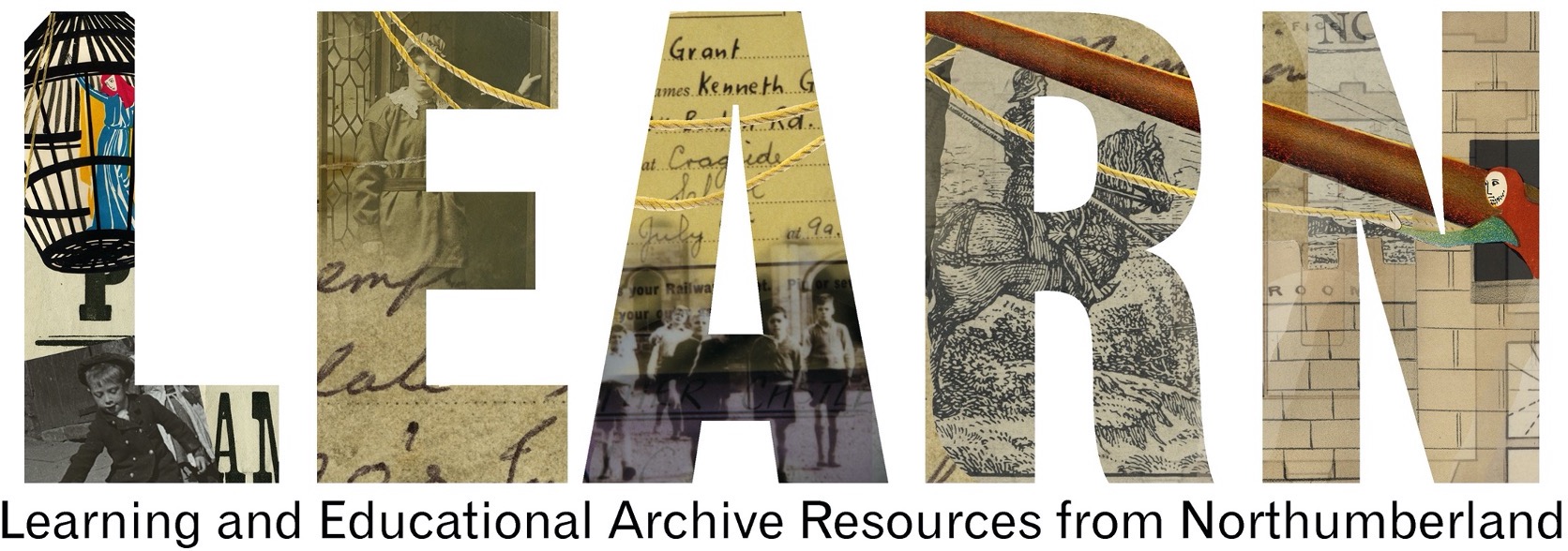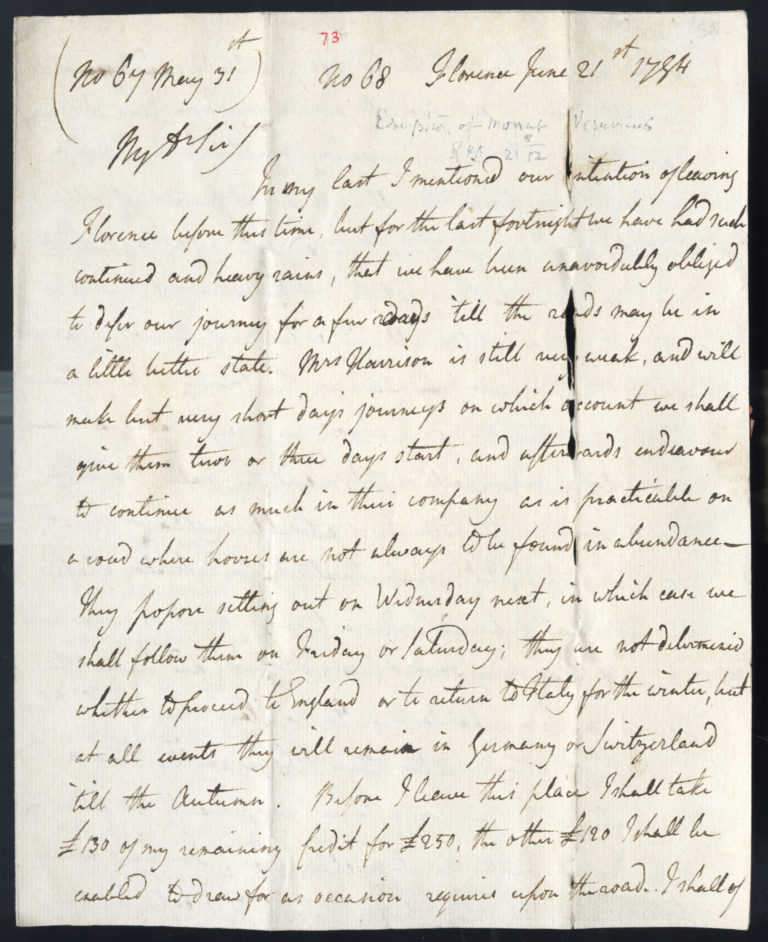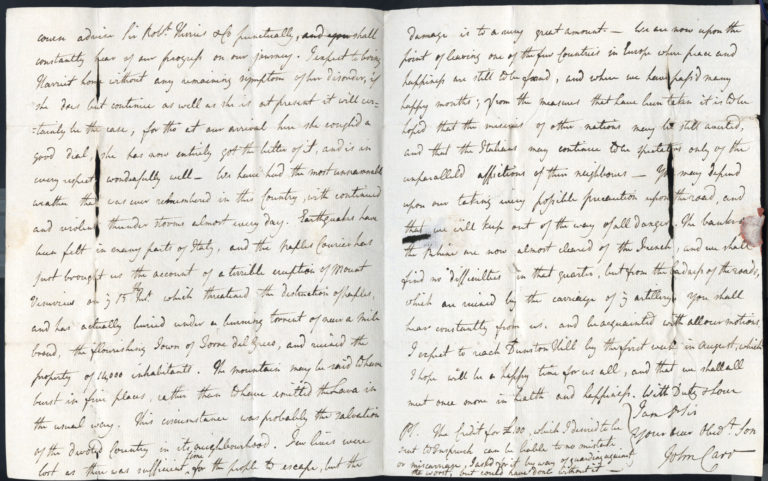Letter from John Carr to Ralph Carr about Travelling Through Europe, 1794
Reference: ZCE F/1/1/1/144
Suggested age groups: KS2, KS3, KS4, Lifelong Learners
Subject areas: History, Geography, Literacy
CONTEXT
During the 18th and 19th century, it was fashionable for wealthy British families to send their sons, and occasionally daughters, on a Grand Tour. This saw privileged young men and women setting off usually from London to travel across Europe. The tourists were affluent enough to spend multiple years on the Tour. They would often carry letters of introduction with them to integrate into society while abroad.
John Carr (1764-1817) and Harriet Carr (1771-1848) were siblings who set out on their Grand Tour in 1791, returning to England in 1794. They were the children of successful northern businessman Ralph Carr and his wife Isabella.
Ralph and Isabella were initially against Harriet going on the Grand Tour but eventually gave their approval because it was thought that the tour would benefit Harriet’s health – she had a cough thought to be tuberculosis. Some of their objections were around fears of the political situation in Europe and potential dangers to travellers. John and Harriet’s ultimate destination was Italy, travelling via France and Switzerland.
John and Harriet spent almost six months in Rome with short trips to Bologna, Florence, Naples, and Turin. They had planned to leave for England in early 1792 but the outbreak of the Franco-Austrian War prevented this. They returned to Florence in May 1792, staying there until November 1793. In December 1793 John and Harriet made a final visit to Rome before leaving for England and arriving home in the summer of 1794.
This letter, written to Ralph Carr towards the end of John and Harriet Carr’s tour, shows some of the perils of travel during a period of war in the late 18th century.
John and Harriet had intended to leave for England in early 1792 but the outbreak of the Franco-Austrian War prevented this. The letter is written from Inspruck, [Innsbruck] Austria and refers to at least three perils of travel at this time – delays due to the political situation, damage to carriages, in this case probably because of the state of the roads, and weather conditions.
In the first paragraph John tells his father that he decided to delay starting the journey home because of fears that the route from Florence was impassable. There may be a further delay leaving Innsbruck as the chaise used by the Carrs needs some repairs. This is likely to have been due to the state of the roads.
It was dangerous for people to carry money while on the Grand Tour as there was a risk of robbery. Instead, tourists relied on letters of credit. These were agreements that allowed the tourist to draw money from their British bank’s agents in the major tourist cities aboard.
As it is uncertain how long the rest of the journey might take John has drawn £100 at a local bank using the letter of credit provided by Sir Robert Herries [& Co.], a London bank. John mentions that he previously withdrew £50 in Florence on the 4th August. John seems keen to inform his father of his expenditure. The Tour was extended for two years because of the political situation in Europe, and this brought Ralph Carr unexpected cost.
In the second paragraph John writes of the current political situation. He makes reference to the death of Robespierre (Maximilien de Robespierre, 1758-1794, radical lawyer and statesman and a key figure in the French Revolution). John has been assured by ‘the Banker who seems a good sturdy matter of fact German’ that Robespierre was dead. This was reassuring news. John now believed ‘we have reason to think that we shall meet with no impediment or difficulty in our road to Coblentz, from thence we shall descend the river to Rotterdam, or otherwise as we are informed on the spot’. The banker’s account was untrue. Robespierre was executed on 28 July 1794. His reported death was a rumour that proved to be incorrect. John and Harriet were to continue their journey home in safety.
(No 71 Florence July 28) No 72 Inspruck Aug[us]t 13th 1794
My D[ea]r Sir
My last would have informed you that we thought it adviseable to remain some time longer at Florence ’till we had an account of what road we could take. We had reason to think that every possible passage was shut up as the mails had been detained ’till eight were due. The day after four of these mails arrived, we set out on our journey on the 6 (sic) of this month, and have this instant arrived here safe and well. We have had no kind of accident, but our Chaise has need of some repairs which may possibly detain us here tomorrow. I have just been at the Bankers where I found Sir Rob[er]t Herries’ letter enclosing the £100 I had desired to meet me here. Not knowing what route we were to take or how long we might be detained in the interior of Germany, as well as to provide against the almost impossibility of the miscarr[iage] of either my letter to Sir Rob[er]t Herries, or of his enclosing the notes for £100, I chose to keep the remainder of my old Credit for £400, (which is now reduced to £120) and in consequence of this precaution on the 4th Aug[us]t I drew in favour of Orsi at Florence for £50, which is independent of any Credit lodged by Sir Rob[er]t Herries & Co of which I addressed them by the same Post, and which they will honour when the Bill becomes due in three months. This I thought expedient at the time, having been detained at Florence longer than I had expected, and wishing to guard against all possibility of inconvenience on the road, whatever might happen. Having rec[eive]d the £100 this was unnecessary, but nothing can lost by it, as I shall have so much the more remaining.
We have so often heard of the death of Robespierre that we were become incredulous on that head, but the Banker who seems a good sturdy matter of fact German has assured me of it so positively that I can no longer doubt, and we have reason to think that we shall meet with no impediment or difficulty in our road to Coblentz, from thence we shall descend the river to Rotterdam, or otherwise as we are informed on the spot. You shall hear regularly of our motions, and fear nothing for our safety wherever we may be. This is the first opportunity I have had of writing since we left Florence otherwise you should have heard from me. Harriet is perfectly well and bears the journey even better than I do which is saying a great deal. We shall remain here to rest tomorrow, though we have not suffered any great fatigue having never been out very early or very late. We shall pursue our journey in the same way, and shall take every possible precaution to avoid all dangers. I have rec[eive]d a letter from Mr Harrison who was frightened away from Stutgard by the French tho’ he had the Rhine and 80 miles between him and them. He has alter’d his second plan of going to Vienna and says that he shall proceed to England. It would be impracticable to travel with two carriages in company as far as we have com[e] and the want of horses is still greater in the interior part [of] Germany. We left many English families in Florence and the neighbourhood, and many at Milan, the danger which threatened Italy seems to be dissipated and if the news we have heard here from Paris prove true, we may hope for some more favourable turn of affairs. I shall hope to find a letter at Franckfort, but should the French be at Manheim we will steer more to the Eastward, and I will write for my letters from Franckfort – we will never come within 50
miles of danger therefore once more be under no apprehensions. We join in Duty & Love. I am D[ea]r Sir your ever Dut[iful] Obed[ien]t J. C
ACTIVITIES
ACTIVITY 1
Background
This letter, written to Ralph Carr towards the end of John and Harriet Carr’s tour, shows some of the perils of travel during a period of war in the late 18th century.
John and Harriet had intended to leave for England in early 1792 but the outbreak of the Franco-Austrian War prevented this. The letter is written from Inspruck, [Innsbruck] Austria and refers to at least three perils of travel at this time – delays due to the political situation, damage to carriages, in this case probably because of the state of the roads, and weather conditions.
SEE
See: Which three perils of travel are mentioned in this letter?
See: What reason does John give for delaying the journey home?
See: When did John and Harriet leave Florence?
See: How long did it take for John and Harriet to reach Innsbruck?
See: Why might their departure from Innsbruck be delayed?
See: Where did John and Harriet plan to travel to from Innsbruck?
See: What political news is mentioned in the letter?
See: How much money did John withdraw in Innsbruck?
See: How much money did John withdraw in Florence?
THINK
Think: Why was it dangerous to carry money while travelling?
Think: How expensive was the Grand Tour?
Think: What mode of transport did John and Harriet use while on the Grand Tour?
Think: Why were the roads in a poor condition?
Think: How did damage to carriages cause delays?
Think: What types of weather conditions would have been faced on this journey?
Think: Why has John written Innsbruck as ‘Innspruck’?
DO
Do: Before reading the context or translation, study the letter for 10 seconds. What is your first impression?
Do: Before reading the context or translation, study the letter for 30 seconds. Are there any words or phrases that stand out to you?
Do: Before reading the context or translation, study the letter for 60 seconds. Can you work out what the main topics, themes or messages are?
Do: Highlight any words or phrases that are unfamiliar to you.
Do: Try to work out what John is saying from your highlighted sections.
Do: Write a translation of the sections of the letter that are unfamiliar to you.
Do: Use a map to plot John and Harriet’s route from Florence to Innsbruck.
Do: Use a map to plot John and Harriet’s route from Innsbruck back home to England.
Do: Create a Venn diagram showing how the three perils of travel mentioned in the letter could a threat to John and Harriet’s journey home.
Do: Imagine you are John or Harriet. Write a diary entry about concerns you might have about travelling considering all of the potential perils.
Do: Use the Bank of England inflation calculator to work out what each of the amounts of money John withdrew would equate to today.
Do: Use the National Archives currency convertor to work out the purchasing power of these amounts in the 1790s. How many days skilled labour are the funds equal to?
Do: Discuss what you can infer about the cost of the Grand Tour based on this data.
Resources
OTHER ONLINE RESOURCES
Money
Bank of England inflation calculator: https://www.bankofengland.co.uk/monetary-policy/inflation/inflation-calculator
National Archives currency converter: https://www.nationalarchives.gov.uk/currency-converter/
The Grand Tour
Travel documents required for the Grand Tour: https://grandtour.bncf.firenze.sbn.it/tale/how-the-journey-was-made/equipment-for-the-journey/passports-health-certificates-bank-credits-letters-of-recommendation
The Grand Tour of Europe: https://www.thoughtco.com/grand-tour-of-europe-1435014
National Trust page about the Grand Tour: https://www.nationaltrust.org.uk/petworth-house-and-park/features/what-was-the-grand-tour
Britannica page on the Grand Tour: https://www.britannica.com/topic/Grand-Tour
History of the Grand Tour: https://educated-traveller.com/2017/11/23/history-of-the-grand-tour/



